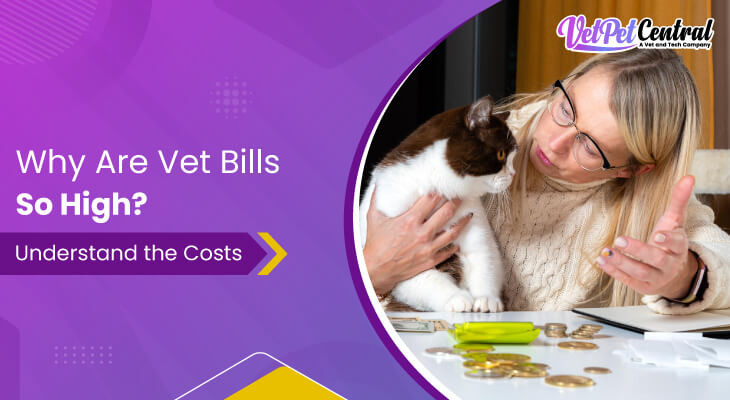Why Is Vet Care So Expensive? Breaking Down Pet Care Costs
 Apr 18, 2025
Apr 18, 2025

Veterinary care is essential for pets, but the cost of maintaining their health has become a significant concern. Many pet owners wonder, "Why is vet care so expensive?" especially when faced with hefty bills for routine checkups, emergency treatments, or medications.
This article discusses the causes of high veterinary expenses and charges, questions the possibility of price gouging, and provides sensible tips on saving money without sacrificing the quality of treatment.
Several things make veterinary care more expensive. As with human medicine, which is usually subsidized by government funds and funded through insurance, pet insurance is available in the US, too.
However, pet owners pay for some veterinary treatments out of their pocket, even if they have pet insurance. Below are the significant reasons why vets are overpriced:
1. Years of Specialized Training and Expertise
It takes years of schooling and practical training to become a veterinarian. A person must:
- Obtain a Doctor of Veterinary Medicine (DVM) degree (takes about 8 years).
- Get experience via residencies and internships.
- Update their knowledge regularly to stay current with developments in veterinary medicine.
Unlike physicians who attend to human beings, veterinarians handle multiple disciplines ranging from surgery and dentistry to internal medicine and emergency care, something that accounts for their astronomical consultation charges.
2. Advanced Medical Equipment & Technology
Modern veterinary clinics now possess updated diagnostic machines, including:
- Ultrasound equipment is used to identify conditions in organs.
- MRI & CT scanners for detecting complex diseases.
- Anesthesia and surgery equipment for primary operations.
They cost tens to hundreds of thousands of dollars, and clinics charge fees to offset the cost of their purchase, maintenance, and upkeep.
3. Veterinary Medications & Treatments
Many pet owners wonder, "Are vets overcharging for medications?" Although it is a fact that certain vet-prescribed drugs can be pricey, the reasons for this are:
- Smaller size of the market: Pet drugs are not mass-produced as human drugs, which makes them more expensive.
- Specialized formulations: Some drugs require a special mixture for pets, which costs more.
- Markups at pet clinics: Pet clinics can charge extra for medications, as there are storage, handling, and convenience costs involved.
4. High Operating Costs for Clinics
Maintaining a vet clinic requires many costs, including:
- Facility Expenses: These include Rental, utilities, and maintenance charges.
- Salaries for Staff: Vets, technicians, and support staff must be remunerated.
- Medical Supplies: Sterile operating room equipment, bandages, and IV fluid supplies total.
- Licensing & Insurance: Clinics have to comply with legal and professional requirements, which can be expensive.
As compared to human hospitals, pet clinics solely depend on payments by pet owners to sustain costs.
So do vets overcharge?
A big concern for the majority of pet owners is, "Am I being overcharged by my vet?" Many owners are worried about paying too much, but how do you determine if your vet is reasonably pricing services? Here are a few ways to tell if vets are overcharging:
- Absence of price transparency: If your veterinarian fails to disclose the details of costs, there may be an issue.
- Recommending excessive tests: Some tests are necessary, but others might be overkill.
- Medication markups: Compare the prices of prescribed medications with those offered by online pet pharmacies to find the best value.
- Pushing unnecessary procedures: Be wary if your vet pushes expensive services without explanations.
If you're not certain if your vet is reasonably priced, consider the following tips in order to not being overcharged at the Vet.
- Compare prices: Call other nearby clinics to determine if they provide similar services at reduced charges.
- Request an itemized bill: Have them itemize the charges so you know exactly what you are paying for.
- Get a second opinion: If a treatment is too costly, a second vet may have an equally good solution at a lower cost.
Precautions to Control Cost
Though vet care is essential, some methods exist for managing and controlling costs without compromising your pet's health.
1. Consider Pet Insurance
A good pet insurance policy can help cover the cost of:
- Emergency visits
- Major surgeries
- Chronic illness treatments
A pet owner can also look for insurance plans that cover routine checkups and preventive care.
2. Look for Low-Cost Veterinary Clinics
Some nonprofit organizations and veterinary schools offer affordable services, including:
- Spay/neuter programs
- Vaccination clinics
- Low-cost wellness exams
3. Shop Around for Medications
Instead of buying medications directly from your vet, consider the following:
- Online pet pharmacies
- Big-box stores
- Always check whether the pharmacy is accredited before buying
4. Ask About Payment Plans
Some animal clinics offer payment plans or financial assistance to help cover the cost of expensive procedures.
Key Takeaways:
- Veterinary services are costly due to education, equipment, and drug expenses.
- Some clinics may overcharge, but price transparency and research can help.
- You can cut costs by comparing pet insurance, buying medication, and vet prices.
- By being attentive, planning, and exploring options, you can give your pet proper medical attention without digging deep into your financial pockets.
FAQs
Why are vet bills so expensive, even for routine checkups?
Routine checkups involve veterinary expertise, examination fees, and preventive treatments, all of which contribute to the cost.
How can I tell if my vet is charging fair prices?
Compare prices with other local clinics, check itemized bills, and research standard procedure rates.
Do vets charge extra for medications?
Yes, veterinary clinics may mark up medications to cover operational costs, but prices can vary. Checking accredited online pharmacies can sometimes offer savings.
Are vet bills negotiable?
Although not all veterinarians permit negotiation of bills, some will provide discounts, payment plans, or cheaper alternatives.
What's the most effective strategy to cope with pet healthcare expenditures?
Buy pet insurance, have an emergency pet fund, and look for inexpensive clinics or wellness programs.
How to know if your vet is too expensive?
To know if your vet is too costly, compare prices, consider the cost variation factors, and always get a second opinion.




